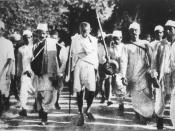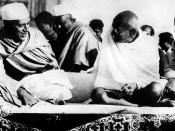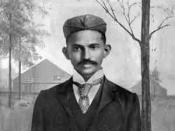There are very few men in history that has accomplished what Gandhi did when he went against one of history's most powerful empires. Gandhi was a small Indian man that took on the British Empire's policies of injustice, discrimination, and colonial domination without in any way resorting to violence. The fact that he overthrew the British Empire by winning Indian Independence stands as confirmation that Gandhi stands as a "great man" in history. Gandhi began his work toward equality in India when he was a young man in South Africa. Through marches, demonstrations, and protests, Gandhi was able to bring the attention of the world to India by displaying the brutalities of the British Empire and not retaliating with violence. The path to Indian Independence was an arduous one for Gandhi, and in order to fully comprehend his toil, one must start at the beginning.
In 1893 Gandhi began working against the subjugation that he, and other Indians working in South Africa, went through.
Gandhi was kicked off a train, touring across South Africa, because he had refused to abandon his first class seat, which was forbidden to people of color, and move to the third class. Shortly after the train episode, Gandhi arranged his initial protest in which he ignited passes that Indians were required to carry at all times in South Africa. Although his first protest was not well attended, Gandhi had acquired enough newspaper support that his next protest drew an enormous crowd. At this second demonstration, which addressed new laws that privately targeted Indians as second-rate citizens that had little rights, Gandhi responded to violent intimidation, coming from the people of the crowd, by asserting, "We will not strike a blow but we will receive them . . .They may torture my body, break my bones,


